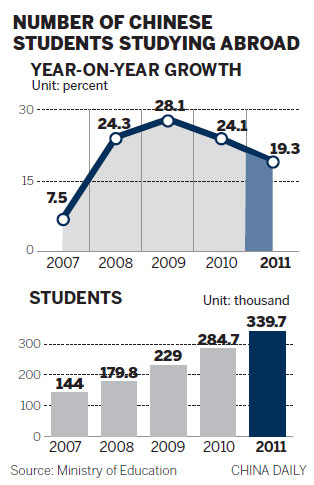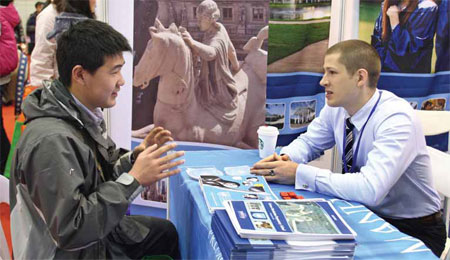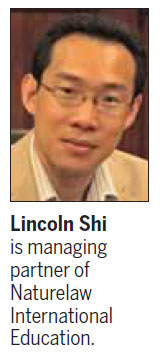Top-grade advice
Updated: 2012-05-18 08:53
By Li Aoxue (China Daily)
|
|||||||||||
|
A student seeks advice for studying abroad at a recent international education exhibition in Shanghai. Provided to China Daily |
The number of overseas education consulting companies in China is rising, driven by the surge in Chinese students studying abroad
 |
Naturelaw International Education LLC, an education consulting company for Chinese students studying overseas, expanded its office in March to one- and- half floors with a floor space of about 5,300 square meters. Established in 2002 in Beijing, Naturelaw has also opened offices in Shanghai, Guangzhou and Jinan over the past three years. More overseas education consulting companies in China are growing, driven by the surge in Chinese students studying abroad.
According to figures from the Ministry of Education, there were 339,700 Chinese students studying abroad last year, a 19 percent increase from 2010.
A survey of about 20,000 students and parents released in February by EIC Group, an overseas education consulting company in Guangzhou, Guangdong province, shows that the United States, the United Kingdom, Australia and Canada are the top four destinations for Chinese students.
The number of Chinese applicants to US universities rose by 18 percent this year, the seventh straight year the percentage has grown by double digits, according to the Council of Graduate Schools, which tallies more than 500 universities and colleges in the US and Canada.
In China, most of the overseas education agencies were established in 1999 after a wave of Chinese families began sending their children to universities abroad with government subsidies and scholarships. Services include advising students to select universities abroad, mentoring students during the application process, helping with visa issues and providing training on foreign language tests such as the Graduate Record Examination (GRE) and the SAT.
Wang Dan, vice-president of JJL Overseas Education Consulting & Service Co Ltd, the largest overseas education consulting and service company in China with more than 2,700 employees, says business has increased 40 percent each year. Last year, it reportedly had 40,000 clients.
"Due to limited capacity of Chinese universities as well as Chinese people becoming more open-minded, a lot of Chinese families in which both of the parents have salaries will try to send children study abroad," Wang says. "It is affordable for most families."
A joint report by the Hurun Research Institute, a company that tallies figures on the nation's wealthy, and the Industrial Bank said in March that among the 2.7 million families with net wealth of more than 6 million yuan ($950,000, 750,000 euros), 85 percent want to send their children to schools abroad.
Wang estimates in the next five years more Chinese students will study abroad. Business, she says, is expected to increase more than 40 percent a year.
Lincoln Shi, managing partner of Naturelaw, says sending children abroad is getting more popular among families whose breadwinners are university professors and government servants.
"As the Chinese economy booms, there is a rise of the middle class who are able to afford to pay for their children to study abroad," says Shi, who claims that business increased by 50 percent last year from 2010.
Jin Ouli, an undergraduate at Huazhong University of Science and Technology in Wuhan, Hubei province, and who got an offer to do her postgraduate studies at the University of Illinois at Urbana-Champaign in September, says the advice from a consulting company has been pivotal in gaining a spot at the US university.
Jin, 22, initially thought of getting her master's degree in Australia, but the overseas consultants suggested applying to a university in the US.
With the surge in Chinese students applying to overseas schools, there are more and more consulting agencies in China.
"They have only 10 or 20 employees, but they will have a niche, such as high school students who want to go abroad, or students who want to study arts abroad," says Shi, who received his MBA degree from Georgetown University in 2002.
"The competition between overseas educational consulting companies has entered into the stage of 'survival of the fittest'," Shi says.
Wang Wei, executive director of Beijing Wiseway Consulting Co Ltd, an overseas education consulting company established in 2000, agrees with Shi that nationwide, other consulting companies are cropping up.
"Previously, a local company in a second- or third-tier city could be the one who used to have all of the business, but as bigger ones launched their branch offices in second- and third-tier cities, these old local ones are getting beaten up by the bigger ones," Wang says.
Although postgraduate students are the primary clients for Chinese overseas education consulting companies, there has been a rapid rise among Chinese high school students who want to study overseas.
Wiseway's Wang says while the company's clients looking to get their master's degrees abroad increased by about 30 percent last year from a year earlier, the number of undergraduate students who want to study in foreign countries rose 40 percent.
"Different from graduates who can do the application themselves, these high school students cannot do it by themselves and will depend on consultants to do it," Wang says.
|
|
Still, he believes most customers in the near future will be Chinese students who want to go to a graduate school overseas since both an undergraduate and graduate degree overseas is a costly venture for most Chinese families.
Consultants said that among Chinese high school students who want to study abroad, many are students from top national high schools, such as the High School Affiliated to Renmin University of China and the Beijing No 4 High School.
"Nowadays, a lot of top-performing students at Beijing's high schools prefer to go to study at foreign universities first," says Li Jiayu, founder of USAdaxue.com and a consultant for students on the SAT.
With more Chinese parents and students becoming more familiar with foreign universities, they are now demanding more diversified services.
Wang of JJL says clients previously did not consider what a student would make after graduating from school and which degree would translate into a good job. Nowadays, Wang says, these are frequently asked questions agencies face.
Li says as cases of Chinese students getting attacked while studying abroad increase, more requests for providing psychological consultation for students on how to protect themselves have begun to become more common.
"I am thinking of including psychology consultation for these students before they go abroad, and I'd like to give lectures on what they should pay attention to while living abroad, reminding them do not go out too late, or rent places that are cheap but not safe and so on," says Li, who has lived in the US for more than 20 years.
But these Chinese consulting agencies are not without controversy. In numerous reports over the years, agencies have been found to write personal essays for students required in their applications.
A New York Times story on Nov 6 cited research by Iowa State University that Chinese students often seek help from agencies "to shepherd them through the admissions process".
In the same report, James E. Lewis, director of international admissions and recruiting at Kansas State University, found several applications "clearly submitted by a single agent".
It also found that five transcripts had the same grades.
Requests for comment from the admission offices of both universities were not returned.
Rossana Lin, China regional chair of MIT's Educational Council in Beijing, says Chinese consulting agencies who are writing essays for clients are not just cheating the schools but their clients as well.
She says the applicants should learn to go through the process themselves and learn to communicate through their writing or they will be unable to handle the rigors of studying in a foreign college.
Li says most of the documents required in an application to a US university, such as transcripts and reference letters, are provided by schools, and that procuring these documents should not be done by a third party such as an overseas education consulting company.
Some agencies interviewed by China Daily admit they did help applicants "polish the language" in applications but that they were unaware it was cheating.
There is no regulation on cheating in China and US authorities or universities have not taken any action against Chinese agencies that were found to have helped students cheat on applications.
liaoxue@chinadaily.com.cn
Today's Top News
Rescuers race against time for quake victims
Telecom workers restore links
Coal mine blast kills 18 in Jilin
Intl scholarship puts China on the map
More bird flu patients discharged
Gold loses sheen, but still a safe bet
US 'turns blind eye to human rights'
Telecom workers restore links
Hot Topics
Lunar probe , China growth forecasts, Emission rules get tougher, China seen through 'colored lens', International board,
Editor's Picks

|

|

|

|

|

|







